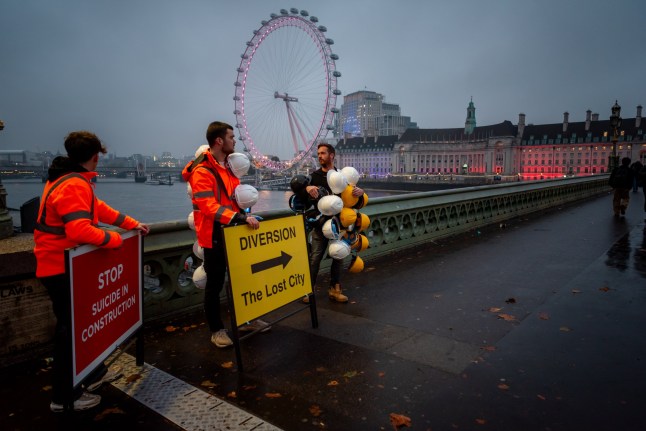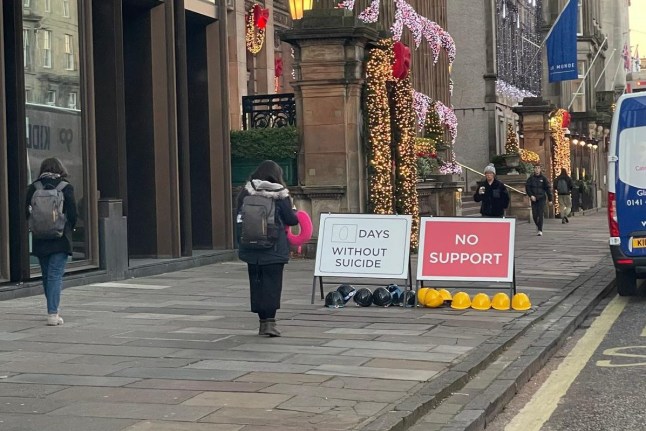
On a cold winter morning, construction workers up and down the UK put on their high vis and laid out hard hats to represent the thousands of colleagues who had lost their lives.
They also put out signs that starkly read: ‘we apologise for any inconvenience during the suicide crisis’ and ‘STOP, suicide in construction’.
Desperate to raise awareness of a silent epidemic within the construction sector, their plan was to hit home just how many lives had been lost to suicide over the last decade.
Kryss Tominay was very nearly one of them.
‘I’ve attempted suicide a few times,’ the stonemason tells Metro from his home in Yorkshire. ‘I felt everyone would be better off without me.
‘I’ve struggled with my mental health since I was about 18. I saw doctors, got put on medication, got taken off it, got put back on… I was going back and forth like that for years. Instead of breaking down and crying, I’d get angry and wanted to be left alone. I told myself I didn’t want to talk to people but deep down I really did. I wanted someone to ask “are you alright?”’

Things got so bad for Kryss that he thought about ending his life in 2018.
‘I ended up at a railway bridge. But then I saw the train lights and I just thought, “what am I doing?”” he remembers.
Kryss, 37, runs Tominay Stone and first got into the profession when he was just 16. He knows all too well how difficult it is for men of all backgrounds to reach out for help with their mental health.
‘I’ve lost three friends to suicide,’ he says. ‘One, Duncan, was my best friend. It’s still a bit upsetting because nobody knew [how he was feeling.] The second, Luke, was a friend of my younger brother who I used to go to the gym with. Another lad called Jordan, he lived round here, died by suicide this year.
‘A lot of men still bottle things up until it all becomes too much. In the construction trade, it’s pretty macho and people don’t want to come across as weak. That’s why we need more people in the industry to stand up and share their experiences.’
It’s estimated that two tradespeople per day take their own lives. Pressures such as tight contracts, long hours, time away from loved ones and the rising costs of supplies can all add up.
Beneath the towering cranes and scaffolding of the UK’s construction sites, the industry’s mental health crisis has reached breaking point, says Lee Wilcox, CEO of On the Tools.
‘If a tradesperson is asked about their mental health by an employer then they’ll likely say they’re fine, even if they’re not,’ he tells Metro. ‘This could be because they’re scared of being sent home, because if they don’t work, they don’t make money and can’t support their families.’
On The Tools was launched in 2014 to tackle the recruitment challenges within the construction sector. A decade later, it works to raise awareness of issues ranging from tool theft to mental health.
Determined to reduce the number of suicides in their industry, Lee launched the ‘Lost City’ campaign this year. He worked out that, due to the 7,000 construction workers deaths by suicide in the last decade, the UK had missed out on building a city the size of Cardiff.


It’s estimated these individuals could have built 150,000 affordable homes, 78 schools, 200 apartment blocks, 30 small offices and one large hospital.
‘We’ve got the highest suicide rate of any industry in an already dangerous industry,’ Lee, 39, continues.
‘Heavy machinery, hazardous material, heights – there’s so much that can go wrong. There are health and safety procedures to protect workers from these dangers. But, somehow, there’s no mental health version of that prevention.’
According to the Office for National Statistics, the construction industry has a suicide rate four times the national average. Mental health struggles are often overshadowed by the demands of grueling work hours, financial pressures, and high levels of isolation. The impact is both personal and widespread, with more than 70% of tradespeople reporting mental health issues, and 64% turning to alcohol or drugs to cope.

‘It’s like a dripping tap with a bucket underneath,’ former construction worker Gavin Crane tells Metro. ‘The drips represent stress, anxiety, depression and industry pressures. Without a release, the bucket overflows.’
Gavin, 40, also knows how easy it can be to suffer in silence. He is currently CEO of Band of Builders, a charity dedicated to supporting tradespeople and their families through some of life’s toughest challenges.
‘There is still a lot of stigma. It’s still a predominantly male industry and so many men don’t open up to each other – that’s the trouble,’ he says.
With Band of Builders, Gavin broaches the subject of suicide when he gives talks at building sites. Over cups of coffee, he gently encourages men to talk about their pent-up emotions before it is too late.


Gavin, from North Cambridgeshire, explains: ‘We can be in a room of 10, 20, 50 people depending on the size of the construction project. I always ask the question: “how many people here know someone that’s died by suicide?” No matter where we are, there’s always at least one person who raises their hand.’
The Lost City campaign team believe that if white-collar professionals were experiencing this kind of suicide crisis, it would be high on the Government’s national agenda to fix.
However much of the UK public – and politicians – are seemingly unaware of the scale of the issue. This is despite the fact that in 2023 alone, mental health-related absences cost the industry £2.74 billion.
Furthermore, according to new research from Direct Line business insurance, tradespeople are feeling the festive crunch the most this December, with 86% missing out on quality time with friends and family this Christmas season due to work demands.
Reach out for support
If you are in need of support for your mental health or have been impacted by any of the subjects in this article, you can call Samaritans on 116123 or email jo@samaritans.org
Lee, from Tamworth, adds: ‘Look out your window, almost everything you see is built by our industry. If we want more infrastructure, more innovation, more schools, more hospitals, then we need to make sure the people behind these buildings are being cared for.
‘We have the worst mental health issues of any industry and no-one is taking ownership of that – there’s no Department for Construction. There’s a reason why health and safety on site is so important and that’s because – by law – the directors of these companies could be imprisoned if they’re found to be at fault if someone dies or gets hurt.
‘Why is it so different when it comes to someone’s mental health rather than their physical health?’
While stonemason Kryss still has difficult days, he says he feels more in control of his life than ever. Part of that transformation is thanks to his wife, Louise, and children, Harry and Isla, who bring light on the darkest of days.
‘They are everything to me,’ Kryss says. ‘If it’s pouring down outside, if I’m worried about getting paid, if I’m head to toe in muck, I just think, “in a couple hours I get to go home and see my family.” They have helped me so much.’

He’s also hopeful that with the impact of the Lost City campaign, change is coming.
‘Sometimes it feels like as soon as you put a high-vis vest on you become invisible – you’re just seen as someone doing a job. But I think people are beginning to see a human element to us now,’ Kryss adds.
‘Today, if I think someone is struggling then I ask if they’re okay. Often they’ll say “yeah, yeah”, butthen I ask them again “are you actually okay?” and it makes them think a little bit. Asking it a second time shows you actually care.’
More Trending
The Lost City campaign hopes to secure £2.5 million to provide life-saving mental health support, including therapy sessions, to tradespeople across the UK. Until then, they will support each other as best they can. When a construction worker does die by suicide, it’s often his or her colleagues who rally around the bereaved family.
‘We look after each other,’ says Gavin. ‘You can start a project as complete strangers and leave it with lifelong friends. In my time with the charity, I’ve met so many incredible people who support their community with their trade.
‘The Lost City campaign is far more than an installation to me, it’s a movement.’
Support the Lost City campaign by clicking here, where you can also find construction specific resources and links to a Just Giving page
Do you have a story you’d like to share? Get in touch by emailing Kirsten.Robertson@metro.co.uk
Share your views in the comments below.
MORE: ‘Depression rooms’ and ‘sociopath chats’ – welcome to the dark side of Roblox
MORE: Lily Allen isn’t in a ‘great place mentally’ and has stopped eating
MORE: Adding this feature to your home could bag sellers £130,000 more













